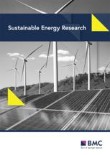High visibility
Sustainable Energy Research's open access policy allows maximum visibility of articles published in the journal as they are available to a wide, global audience.
Speed of publication
Sustainable Energy Research offers a fast publication schedule whilst maintaining rigorous peer review; all articles must be submitted online, and peer review is managed fully electronically (articles are distributed in PDF form, which is automatically generated from the submitted files). Articles will be published with their final citation after acceptance, in both fully browsable web form, and as a formatted PDF; the article will then be available through Sustainable Energy Research and SpringerOpen.
Flexibility
Online publication in Sustainable Energy Research gives you the opportunity to publish large datasets, large numbers of color illustrations and moving pictures, to display data in a form that can be read directly by other software packages so as to allow readers to manipulate the data for themselves, and to create all relevant links (for example, to PubMed, to sequence and other databases, and to other articles).
Promotion and press coverage
Articles published in Sustainable Energy Research are included in article alerts and regular email updates.
In addition, articles published in Sustainable Energy Research may be promoted by press releases to the general or scientific press. These activities increase the exposure and number of accesses for articles published in Sustainable Energy Research.
Copyright
Authors of articles published in Sustainable Energy Research retain the copyright of their articles and are free to reproduce and disseminate their work (for further details, see the copyright and license agreement).
For further information about the advantages of publishing in a journal from SpringerOpen, please click here.
